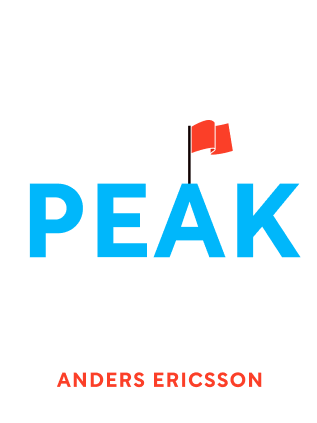

This article is an excerpt from the Shortform book guide to "Peak" by Anders Ericsson. Shortform has the world's best summaries and analyses of books you should be reading.
Like this article? Sign up for a free trial here .
Why does Ericsson, the author of Peak, claim that Gladwell’s 10,000 hour rule is a myth? Is there such thing as natural-born talent?
Peak author, Anders Ericsson, claims that the 10,000 hour rule and natural-born talent are myths. He says that the only way to become an expert at something is to apply deliberate practice. With this method, anybody could potentially become a master of anything.
Keep reading to discover why Ericsson rejects the 10,000 hour rule and the idea of natural-born talent and how you can use deliberate practice in your life.
Deliberate Practice in Your Life
You may have heard of deliberate practice as it relates to sports, instruments, or hobbies. But you can apply the principles of deliberate practice and mental representations to many everyday fields to improve your performance. In time, you can improve to the point where you can train others and bring them up to your level of performance—strengthening your entire organization.
Rejecting the Myths
Improvement is only possible if you and your organization let go of some popular myths about practice and human importance.
The first is the highly deterministic idea that your abilities are limited by your genetic characteristics. This is the old idea about “natural-born” talent: some people simply have it, and others don’t. It shows up in the defeatist statements people make when they don’t immediately achieve what they set out to: “I can’t manage people,” “I’m just not that creative,” or “I’m just not a math person.” We know this isn’t true: outside of people who suffer from severe physical or mental limitations, with the right practice, just about anyone can improve in any area they choose.
The second myth is the Gladwell-inspired idea that if you do something enough times, or for long enough, that you’ll automatically improve, or the 10,000 hour rule. But this is just a naive form of practice: repeating the same thing in the same way over and over again is hardly a recipe for success, no matter how many times you do it. While no one would deny the importance of hard work, this is far from being the only part of the equation. Simply “trying harder,” by itself, will not yield the desired results. There’s usually a right way and wrong way to do something. If you’re doing something the wrong way, but “trying harder,” you won’t see much difference (and, in fact, you might make things worse by doubling down on your faulty approach).
Most people engaged in business or regular 9-5 jobs don’t devote outside time to honing their skills, the way an aspiring violinist or chess master might. The key, then, is to use that time at the office and transform it into an opportunity for learning and skill-building. One company, Blue Bunny Ice Cream, used its regular meetings between regional sales managers and the senior sales manager to stage role-playing exercises, in which the regional sales manager practices making their pitch to a customer and receives feedback on their approach. This not only helps refine the skills needed for the next call with a customer, but it also gets everyone in the company used to the idea of practicing itself—it just becomes a normal part of the business day.
The Myth of the 10,000 Hour Rule
In his book Outliers, Malcolm Gladwell popularized the 10,000 hour rule, or the idea that it takes 10,000 hours of practice to become great in essentially every field of human endeavor. It’s appealing because it’s simple to remember and posits an easy cause-and-effect relationship.
But the 10,000 hour rule isn’t true: it’s a gross oversimplification of the accepted research on the effects of deliberate practice. What Gladwell did was extrapolate the data that Anders Ericsson (the author of Peak) compiled from the study of the violin students. The results of that study showed that the best violin students would practice around 7,400 hours by the time they turned 18—Gladwell simply extended that rate of practice to the age of 20 to get the 10,000 hours figure, because it was a nice, round number, thus inventing the 10,000 hour rule.
But there’s nothing particularly significant about the figure of 10,000 hours. Moreover, the number (if there can even be said to be such a number) varies greatly from field to field. Digit-memorization at the level of a Feng Wang takes far fewer hours of practice than becoming a concert violinist.
Also, Gladwell’s figure treats “practice” as monolithic: he makes no distinction between different kinds of practice. But the quality of practice matters more than quantity. Sitting in your room and merely repeating the same lesson over and over again for a set number of hours is far different from true deliberate practice, which makes use of clear goals and effective mental representations, in which you address weaknesses and make specific improvements. Not all practice is created equal.
Natural-Born Talent is a Myth
One of the most enduring beliefs is the idea that some people have natural-born talent that enables them to excel in a particular field with comparatively little effort. In fact, innate characteristics play a much smaller role in determining performance than most people believe. Great performers and great performances are the product of long, careful, and deliberate practice. The idea of prodigies is revealed as being largely a myth, now that we have an understanding of how deliberate practice works.
There is usually a wide variability in the performance level of beginners in most fields. Some seem to excel easily, while others struggle at the outset. This also contributes to the idea that some people are just born with innate talent. But this is false. One study of young chess players, for example, showed that the amount of chess practice performed by a student was far more correlated with high scores than raw intelligence (as measured by IQ scores).
In fact, among the best-performing players, high IQ was negatively correlated with high scores in chess. The researchers found that the lower-IQ members of this elite group within the study were more likely to devote time to deliberate practice—and practice simply counted for far more than intelligence. The quality of mental representations that these elite players developed through deliberate practice was a far more important factor in their success than anything else, rendering other characteristics far less statistically significant.
The idea of prodigies is highly appealing. People want to believe in something magical or divine and reject the notion that so many wonderful parts of the human experience can be explained through science, reason, and observation. But while such a belief does speak to the unquenchable human need for mystery and wonder, it is actually quite limiting. Accepting that some people simply have natural-born talent and others don’t might discourage you from even trying to fulfill your dreams: “I’m not good at this, so why bother?”
And it can become a self-fulfilling prophecy—people who develop the idea that they’re “bad” at something never practice, and, therefore, never get good at it. The opposite is also true. Children who show some early promise in music, mathematics, or athletics tend to be lavished with attention and praise from teachers and parents and receive more training and resources to help them develop their skills than children who struggle. The “gifted” students don’t possess some innate ability that others don’t, they’re just (mistakenly) given more of an opportunity to develop. This is truly tragic—the world has likely been deprived of the talents of countless people who were deemed at an early age to be “no good” at things.
And we know from our study of deliberate practice that improvement—even great improvement—in almost any field is possible for nearly everyone who is willing to stick with it and push themselves a little further after each incremental improvement. This is a far more inspiring and empowering idea than a belief in natural-born talent—it shows us the true power of the human body and mind.

———End of Preview———
Like what you just read? Read the rest of the world's best book summary and analysis of Anders Ericsson's "Peak" at Shortform .
Here's what you'll find in our full Peak summary :
- How to become an expert in any field you choose
- Why practice isn't enough because you need to change how you practice
- Why natural talent isn't enough and practice is more important






